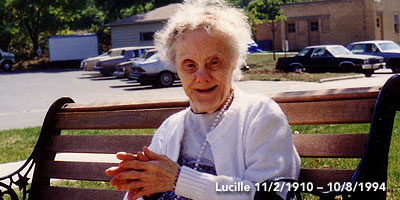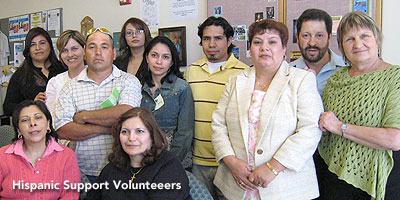
Background Information
The Origins of the Term Down Syndrome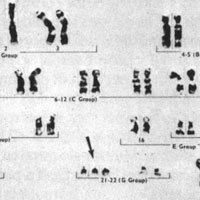
In 1866 British physician, John Langdon Down, for whom the syndrome is now named, first described Down syndrome, as “Mongolism.” The term Down syndrome didn’t become the accepted term until the early 1970s. More was learned about the condition in 1959 when French Pediatrician/Geneticist Professor Jerome Lejeune discovered that individuals with Down syndrome have an extra chromosome—just one year before NADS was founded. Shortly thereafter, chromosome studies were developed to confirm the diagnosis of Down syndrome.
Historical Climate
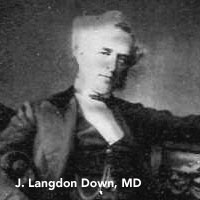 During the first half of the twentieth century in the United States, the majority of children with Down syndrome were placed in institutions – frequently soon after birth. This resulted in great human sacrifice for those individuals and for their families, who were convinced, often by members of the medical community, that the child was less than human and that their needs would be so great, their families would not be able to raise them. These children were “warehoused” in large state institutions – often in deplorable conditions – locked away so that the rest of society could not see the horror of their lives.
During the first half of the twentieth century in the United States, the majority of children with Down syndrome were placed in institutions – frequently soon after birth. This resulted in great human sacrifice for those individuals and for their families, who were convinced, often by members of the medical community, that the child was less than human and that their needs would be so great, their families would not be able to raise them. These children were “warehoused” in large state institutions – often in deplorable conditions – locked away so that the rest of society could not see the horror of their lives.
This was the climate that the founders of the National Association for Down Syndrome had to deal with when their children were born in 1960.
The Early Days of NADS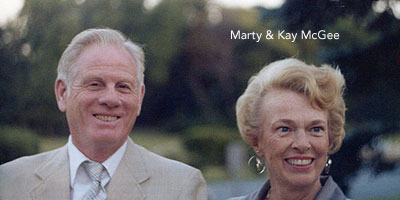
The National Association for Down Syndrome (NADS) is the oldest organization in the United States serving children and adults with Down syndrome and their families. It was founded in Chicago in 1960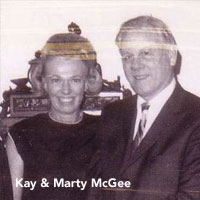 by Kay McGee shortly after her daughter Tricia was born with Down syndrome. In those days the standard operating procedure in hospitals was for physicians to advise parents to institutionalize their newborn infants with Down syndrome. Parents who did not follow this advice took their babies home without support or services. Kay and Marty McGee chose to ignore the advice of their pediatrician and they took Tricia home. After the initial shock of learning that their baby had Down syndrome, Kay, with the support of Marty, began to reach out to professionals and other parents of children with Down syndrome, and that was the beginning of an organization that would always recognize the great value of individuals with Down syndrome and of parents helping parents.
by Kay McGee shortly after her daughter Tricia was born with Down syndrome. In those days the standard operating procedure in hospitals was for physicians to advise parents to institutionalize their newborn infants with Down syndrome. Parents who did not follow this advice took their babies home without support or services. Kay and Marty McGee chose to ignore the advice of their pediatrician and they took Tricia home. After the initial shock of learning that their baby had Down syndrome, Kay, with the support of Marty, began to reach out to professionals and other parents of children with Down syndrome, and that was the beginning of an organization that would always recognize the great value of individuals with Down syndrome and of parents helping parents.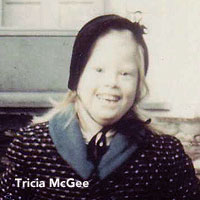
In the sixties and early seventies, the condition was not known as Down syndrome but “Mongolism,” and the original name of the organization was Mongoloid Development Council (MDC). With the help of a few other parents, Kay formed an informal board, and for many years their meetings were held in the home of Kay and Marty McGee. Kay ultimately became the Executive Secretary, and she was the driving force behind the organization from 1960 to 1975. (Kay actually completely filled the role of president, but in 1960, women were not usually seen as presidents of organizations.) In addition to the day-to-day running of the organization—handling all phone calls in her home, doing the clerical work and information flyers (keep in mind that 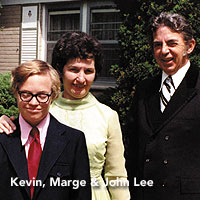 NADS didn’t begin using computers until 1989)—Kay organized regular meetings for parents in downtown Chicago, bringing in speakers from as far away as Germany. All the Down syndrome conferences in the 1960’s and early 1970’s were held in the Chicago area. Kay and the other parent founders of NADS were truly pioneers as they developed support systems for each other and especially for new parents.
NADS didn’t begin using computers until 1989)—Kay organized regular meetings for parents in downtown Chicago, bringing in speakers from as far away as Germany. All the Down syndrome conferences in the 1960’s and early 1970’s were held in the Chicago area. Kay and the other parent founders of NADS were truly pioneers as they developed support systems for each other and especially for new parents.
In the 1960’s there were no mandated programs or services for children with special needs, so many parents started programs in church basements and in other community buildings. Many of the private agencies that currently serve adults with developmental disabilities throughout the Chicago area were started in this way. They not only built a strong foundation for our organization, but they also fought vigorously for early intervention and education services locally and nationally. We will be forever indebted to those courageous parents.
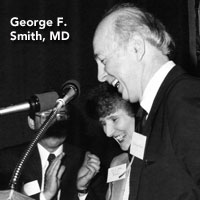 Parents and Professionals Working Together
Parents and Professionals Working Together
From the beginning, NADS parents worked closely with professionals – people such as Julia Molloy, a wonderful speech therapist who was a great source of information, encouragement and strength for our parents. (Molloy School in Morton Grove was named for her.) Another professional who was very active was Delilah White, a psychologist at the Levinson Institute. And later Dr. George Smith, a physician, author and researcher, also worked closely with 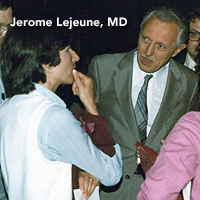 NADS. So, from the beginning, even though the organization was mainly “parent driven,” we have always had professionals actively involved on our board of directors and on our committees. In addition many fine professionals throughout the years have given of their time and talent by giving informative presentations at our conferences, annual meetings and at our behavior retreats. They have also worked with our children and adults on many levels, and they have added valuable dimensions to our organization.
NADS. So, from the beginning, even though the organization was mainly “parent driven,” we have always had professionals actively involved on our board of directors and on our committees. In addition many fine professionals throughout the years have given of their time and talent by giving informative presentations at our conferences, annual meetings and at our behavior retreats. They have also worked with our children and adults on many levels, and they have added valuable dimensions to our organization.
Building a Strong Organization
Name Change
 Even though MDC primarily served the Chicago metropolitan area, the organization received requests for information from all over the country. Therefore in 1972 when a decision to remove what became known as the “M” word from our name and materials, the organization changed its name to National Association for Down’s Syndrome. (The apostrophe s in Down’s was officially dropped in the early 1980’s.) It’s important to remember that NADS was founded 12 years before the National Down Syndrome Congress was formed and almost 20 years before the National Down Syndrome Society. However, our board of directors was comprised of people from the Chicago metropolitan area and, therefore, in 1972, Kay McGee and other NADS leaders spent a good deal of time with parents and professionals from other parts of the country helping to establish a new national organization. The Down Syndrome Congress was founded in 1973, and Kay McGee was elected to be its first Treasurer and NADS Board President Lucille Msall became Recording Secretary.
Even though MDC primarily served the Chicago metropolitan area, the organization received requests for information from all over the country. Therefore in 1972 when a decision to remove what became known as the “M” word from our name and materials, the organization changed its name to National Association for Down’s Syndrome. (The apostrophe s in Down’s was officially dropped in the early 1980’s.) It’s important to remember that NADS was founded 12 years before the National Down Syndrome Congress was formed and almost 20 years before the National Down Syndrome Society. However, our board of directors was comprised of people from the Chicago metropolitan area and, therefore, in 1972, Kay McGee and other NADS leaders spent a good deal of time with parents and professionals from other parts of the country helping to establish a new national organization. The Down Syndrome Congress was founded in 1973, and Kay McGee was elected to be its first Treasurer and NADS Board President Lucille Msall became Recording Secretary.  Later the DSC added “National” to their name. Their board members were and still are from many states, which provides them with a strong national representation and perspective.
Later the DSC added “National” to their name. Their board members were and still are from many states, which provides them with a strong national representation and perspective.
NADS continues to receive requests for information from all over the U.S. and our newsletter, audio/visual programs, print materials and our website are used by families and professionals throughout the country and beyond. However, some of our programs such as our Parent Support, Hospital Development and Mentoring Programs are only available in the Chicago metropolitan area. Also, the services we provide through our collaboration with the Adult Down Syndrome Center are limited to the state of Illinois.
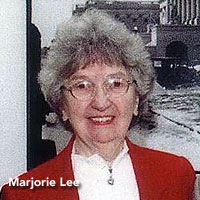 History of the Parent Support Program
History of the Parent Support Program
During the 1960’s and early 1970’s Kay McGee and Marjorie Lee, whom Kay described as “the most knowledgeable and involved parent there was,” would visit hospitals where they pleaded with nurses in the newborn nurseries to notify them when a baby was born with Down syndrome. In that way, they were able to connect with new families and provide them with the support they needed. (Ah, the things you could do before the HIPAA regulations).
Sheila Hebein becomes Executive Director
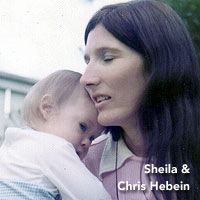 Sheila and Peter Hebein’s son, Christopher, was born in June 1972 and was diagnosed with Down syndrome just a few hours after his birth. The Hebeins were much more fortunate than the McGees when being told of their child’s Down syndrome diagnosis. Even though in 1972 some parents were still being advised by doctors to institutionalize their child, the Hebeins had a very sensitive pediatrician and he gave them good information and said “So much more is being done for children with Down syndrome now and the most important thing you can do for him is to love him.”
Sheila and Peter Hebein’s son, Christopher, was born in June 1972 and was diagnosed with Down syndrome just a few hours after his birth. The Hebeins were much more fortunate than the McGees when being told of their child’s Down syndrome diagnosis. Even though in 1972 some parents were still being advised by doctors to institutionalize their child, the Hebeins had a very sensitive pediatrician and he gave them good information and said “So much more is being done for children with Down syndrome now and the most important thing you can do for him is to love him.”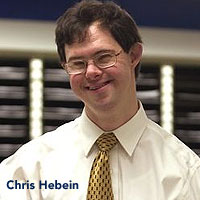
Sheila and Peter had a wonderful support system of friends and family and they were blessed in that Chris has enjoyed good health. Chris went to early intervention programs, to a special education school, to a Montessori school, 2 regular education schools and he graduated from Park School in Evanston in 1993. Park School provided Chris with an excellent education including a vocational program and he had several training opportunities in the community. During his final year of school, his vocational coordinator developed a job for him as a mail clerk. When he graduated he began working in that it position 40 hours a week. He has been in the same job for the past 19 years. Chris gets to and from work on the 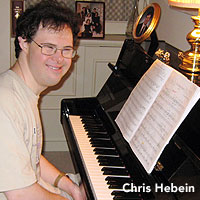 Chicago public transit system – he enjoys his job and is considered a valued member of his company. Chris has lived in the Evanston community all his life – he is an active member of St. Nicholas Church, serving for over 25 years as an altar server. He started playing the piano when he was 13 years old, he composed and performed for many years and even though he no longer takes piano lessons, he plays every day and continues to enjoy music. Chris has many interests, loves sports and social events. He has enjoyed quite a different life than those born with Down syndrome just a generation earlier.
Chicago public transit system – he enjoys his job and is considered a valued member of his company. Chris has lived in the Evanston community all his life – he is an active member of St. Nicholas Church, serving for over 25 years as an altar server. He started playing the piano when he was 13 years old, he composed and performed for many years and even though he no longer takes piano lessons, he plays every day and continues to enjoy music. Chris has many interests, loves sports and social events. He has enjoyed quite a different life than those born with Down syndrome just a generation earlier.
Sheila was elected to the board of directors of NADS in 1974 and served on the board before becoming Executive Director in 1979. She served in this position for 30 years and retired in 2009. She continues to be involved with NADS working on special projects and still serves on the team of the Adult Down Syndrome Center, attending meetings and providing a parent perspective.
As Executive Director of NADS Sheila developed all the following programs. She was involved on a national level, working closely with the 2 national organizations, the National Down Syndrome Congress and the National Down Syndrome Society and in later years, with the Down Syndrome Affiliates in Action. She also worked with many professional organizations throughout the years.
Development of Parent Support Program
Even though things were improving in the area of education (see Special Education for Children with Disabilities below), NADS leaders were still concerned that many new parents throughout the Chicago metropolitan area were not receiving the kind of medical care and support they so desperately needed when their baby was born with Down syndrome. Parents were taking their baby home from the hospital without accurate information and ongoing support. In fact, many were completely isolated in their communities.Therefore, in 1979 NADS developed a program that would train parents of children with Down syndrome to provide sensitive support to new families.
This formal training program was designed to teach parents to become “Parent Support Volunteers.” We recruited parents from all over the Chicago metropolitan area to participate in this important training. The two-day training prepared them for the variety of situations they would encounter in working with new families. A psychologist offered guidance about how to respond to families in crisis. A developmental pediatrician and a geneticist covered the kinds of health-related questions new parents might have—an important area, since many children with Down syndrome are born with heart defects or other serious medical problems. In order to maintain a fresh group of volunteers, NADS provided training for new groups of Support volunteers every 2 to 3 years. In the later training sessions, we added a panel of experienced support volunteers who shared their experiences. This veteran group discussed many of the significant issues a parent support volunteer might face, including how to take into account the different reactions of the mother and the father, how to distinguish between support and counseling, how to offer support to parents who had not yet decided whether to keep their baby, and how to help a family through a medical crisis. By the end of the second day of training, the volunteers were prepared for almost any scenario.
Local Support Groups
Because NADS served the whole Chicago metropolitan area, it was difficult to get people together on a regular basis. In the sixties and early seventies we held 4 meetings a year in downtown Chicago, but as the organization grew, we looked for ways to grow local support groups to make information more accessible for all families.
The first local support group in Chicago was started on the north shore in the mid-seventies by Sheila Hebein, who believed strongly in a grass roots approach to community organizations. A few years later individuals in other parts of the Chicago area felt a need to meet regularly with other parents and so groups such as Ups for Downs, Downs Development Council and the West Suburban Support Group for Down Syndrome were formed. These local groups continue to play a critical role in providing ongoing support and education to parents.
During the 1990s several support groups were developed for parents of adolescents with Down syndrome. A group was also formed for parents whose children with Down syndrome had challenging behaviors.
Temporary Foster Care
In 1982 a very important aspect of our support to new parents was our temporary foster care program. This program was established because we found that several sets of parents, within a very short period of time, had relinquished their rights to their child before the baby was a week old. Therefore, we worked with the Illinois Department of Children and Family Services and a private adoption agency, and several NADS families became licensed foster families. Our families provided loving care on a volunteer basis. NADS paid for their out-of-pocket expenses, but they volunteered their love and care. Initially the majority of children cared for by our foster care families were ultimately adopted.However, during 1992 we provided foster care for four infants, and three of the four later went home to their biological parents, and we facilitated adoption for the fourth child. We discontinued our foster care program in 1995 because of difficulties with the Illinois Department of Children and Family Services. However, we continue to facilitate adoption when necessary, but an adoption agency now handles the intensive counseling for the biological and adopting parents. At the present time it is less common for parents to relinquish their rights to their child with Down syndrome. However, in some circumstances adoption is the best option for the baby and for the biological families, and the Down syndrome community has been blessed with many wonderful adoptive families.
Hospital Education Programs
Even though NADS had trained support volunteers willing to assist new parents, we were still faced with the challenge of obtaining regular referrals of all new parents in the Chicago metropolitan area. In order to address this problem we developed an education program for medical professionals.
Shortly after our Parent Support Training, NADS developed an audio/visual program, “You Don’t Outgrow Down Syndrome, Counseling Parents.” With this tool, Sheila Hebein, Executive Director, presented hospital education programs in Chicago area hospitals for pediatricians, obstetricians, geneticists, residents, social workers, nurses and other professionals who worked with new parents. This proved to be a very effective way to educate the medical community and it proved to be a good way for us to develop cohesive referral services for new parents. When this program started in 1980, NADS received only 15 direct referrals from Chicago area hospitals, but 10 years later, we were receiving 150 direct referrals.
The primary goals of our Hospital Education Programs were and still are:
- Provide physicians, residents, nurses and social workers with up-to-date information on Down syndrome and prepare them to give sensitive care and support to parents of newly diagnosed infants with Down syndrome. This is accomplished through our in-services, which are conducted in hospitals or in the offices of physicians.
- Maintain up-to-date materials for medical professionals.
- Develop effective referral systems in the medical community to ensure that new parents are directly referred to our Parent Support Program whenever possible.
Because there were over a hundred hospitals in the Chicago metropolitan area, the need for our education programs was also growing, so in 1984 NADS trained its first group of Public Speakers, and since that time our staff and trained volunteers have provided education programs in Chicago area hospitals. Throughout the years we have continued to train parents to be public speakers.
Complex Medical Issues
Baby Doe Law
In the 1970s and early 80’s, NADS and other advocates fought against the practice of some medical professionals who recommended that infants with Down syndrome not receive life-saving surgeries for conditions such as duodenal atresia or esophageal atresia. Instead they wrote orders that the babies not be fed, and the end result was that babies were starved to death in quiet corners of some hospitals.
In 1982, a Bloomington, Indiana baby with Down syndrome, known as Baby Doe, was born with esophageal atresia. Because the baby had Down syndrome, the parents were encouraged by their doctor not to give permission to operate. When word of the situation became public, a dozen families came forward and offered to adopt the baby. The offers were refused. The parents, their doctors, and the Supreme Court of Indiana said they had the right to starve the child to death. The baby died seven days after birth, before the U.S. Supreme Court could hear an appeal to the Indiana decision. This case and that of Baby Jane Doe in New York outraged advocates, who worked tirelessly to get the U.S. Congress to pass legislation in 1984 prohibiting the withholding of “medically indicated” treatment from any child born with a disability.
The Surgeon General of the United States at the time of these incidents, C. Everett Koop, stated publicly that he disagreed with such withholding of treatment. In his decades as a pediatric surgeon, Dr Koop had repaired hundreds of such defects, with a continually improving rate of success. By 1982, success was nearly certain if the surgery was performed. Because of the public outcry, the Baby Doe Amendment was added to the Child Abuse Law passed in 1984 in the United States, and it set forth specific criteria and guidelines for treatment of seriously ill and/or newborns with disabilities. This law mandates that states receiving federal money for child abuse programs develop procedures to report medical neglect, which the law defines as the withholding of treatment unless a baby is irreversibly comatose or the treatment is “virtually futile” in terms of the newborn’s survival. Opinions about a child’s “quality of life” are not valid reasons under this law for withholding medical care.
This was the climate that NADS was trying to navigate as these complex issues arose. Sheila Hebein, NADS’ Executive Director, served on the Pediatric Bioethics Committee of Lutheran General Hospital for several years during this time. She learned a lot about the complexities of many situations that parents had to deal with, and she was able to contribute much to the discussion from a parent’s perspective.
The Dilemma of Down Syndrome and Early Detection
In 2007 NADS’ Executive Director spoke at a conference for Genetic Counselors:
Now that Down syndrome can be detected earlier, our concern is that the medical community, which has shown biases in the past, will once again be placed in a position of great influence over life and death decisions. Will doctors be able to sensitively discuss the diagnosis with the parents? Will they be able to tell of the gifts as well as the challenges? Will they give the parents a balanced picture so that they can make an informed decision about what is best for them – for ultimately, it is the parents’ decision to make. They could even say no to the testing.
Perhaps one of the problems is that unlike pediatricians and family practitioners, obstetricians and most genetic counselors don’t often encounter children with Down syndrome in their practices. They don’t see the baby they gave dire predictions about grow to be a beautiful child. They don’t know that children and adults with Down syndrome are now very much part of our communities – not hidden away but celebrated and cherished by their family and friends. Many children with Down syndrome grow up to be artists, dancers, musicians, figure skaters, soccer players, students, employees, voters and just plain old citizens. However, regardless of their abilities or challenges, our children should not have to earn a place in our society. NADS has always fought for a level playing field for children with Down syndrome before and after they are born.
Education
Special Education for Children with Disabilities
After many years of hard work by parents and other advocates, education for all children with disabilities became a federal law. On Nov. 29, 1975, then-President Gerald Ford signed into law the Education for All Handicapped Children Act (Public Law 94-142).
In adopting this landmark civil rights measure, Congress opened public school doors for millions of children with disabilities and laid the foundation of the country’s commitment to ensuring that they have opportunities to develop their talents, share their gifts, and contribute to their communities.
In the last 35 years, expectations for all students, including students with disabilities, have expanded. Classrooms have become more inclusive and the future of children with disabilities brighter. Significant progress has been made toward protecting the rights of, meeting the individual needs of, and improving educational results for infants, toddlers, children, and youths with disabilities.
Since 1975, policies and practices that meaningfully include students with disabilities in general education classrooms and accountability systems have proliferated. In 2010 nearly 60 percent of students with disabilities were in general education classrooms 80 percent or more of their school day. Early intervention services are now provided to nearly 350,000 infants and toddlers with disabilities and their families, and over 6.6 million children and youths receive special education and related services designed to meet their individual needs.
In 2010, the 35th anniversary of the passage of Public Law 94-142 was celebrated. It is now known as the Individuals with Disabilities Education Act (IDEA).
For more information on Public Law 94-142 go to:http://idea.ed.gov/explore/home.
Education Within NADS
Even though federal and state laws mandated free appropriate education for all children with disabilities, NADS families still had to fight for their child’s rights, and we developed programs to assist in this effort:
Education Facilitators
In 1987 NADS trained a group of parents to be Education Facilitators–i.e. they were trained to assist parents experiencing problems with their school districts. Unfortunately because of family responsibilities and work schedules, volunteers were not usually available during the week when school meetings were scheduled, so NADS staff members provided advocacy and assistance to families dealing with education challenges.
Parent-to-Parent Program
For many years NADS has provided support and information to families who call on us for assistance with school issues. Often the questions are about inclusion versus special education settings. Sometimes there are questions about IEPs and strategies for successful school experiences for our children. Another set of issues pertains to appropriate support for transitions from elementary to high school and, one of the most difficult transitions – from high school to post-secondary programs. We receive regular phone calls from out of state families moving toIllinois. They frequently ask us about the philosophy of school districts and what their track record is in educating children with Down syndrome. Those involved in our Parent-to-Parent Network were willing to share their experiences with other parents who were interested in learning more about school districts in the Chicago metropolitan area.
Education Programs for Students
NADS staff and trained public speakers have provided education programs in schools for students in elementary, junior high, high school and college. These presentations have emphasized the fact that children with Down syndrome are children first and have gifts and challenges just like other children.
NADS Conferences
NADS has held conferences in the Chicago area since the early 1960’s – Professor Jerome Lejeune gave presentations several times in the 1960’s, 70’s and in 80’s. Since 1980 NADS has held a conference every other year featuring an array of local and national speakers, including physicians, researchers, educators, therapists, parents and individuals with Down syndrome. Topics addressed have included health issues, communication skills, reading, sensory processing, post secondary programs, and many other subjects of interest to parents and professionals.
A conference for teens and adults with Down syndrome runs concurrently with the conference for parents and professionals. Some of the topics covered have included: social relationships, health issues, safety in the community, and work skills; participants also have an opportunity to take part in interactive drama and dancing.
In later years workshops were also offered in Spanish, and our Spanish-speaking parents were able to receive information in their native language – topics such as the IEP process, education rights and developing strategies to succeed at school and in the community.
Meeting the Needs of Adults with Down Syndrome
During the early and mid 1980s, NADS’ primary focus was on education and support to families of children with Down syndrome. However, by the late 1980s we became more aware of the needs of adults with Down syndrome and their families. We received calls from parents whose son or daughter lived at home but had not gone to school and had been hidden within their families. We received desperate phone calls from parents who could not find even basic medical care for their son or daughter. We also found individuals with Down syndrome who had been institutionalized at birth and had no contact with their families – this group of men and women had been moved out of large state institutions into group homes or nursing homes, which in some instances were not much better than the large institutions. We asked ourselves the question – if we don’t help this group of adults who have been shunned and neglected all their lives – who will? We determined that NADS would try, and we set about looking for better ways to serve our adults.
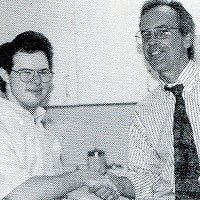 NADS Fellowship for Adults
NADS Fellowship for Adults
In 1989 NADS developed a fellowship with The Family Study and Service Program at the University Affiliated Program (UAP) for Developmental Disabilities, University of Illinois at Chicago. Through the UAP fellowship we obtained the services of Dennis McGuire, who had an extensive background in family counseling. Dennis was finishing his final year of study for a PhD in social work. He was assigned to NADS 20 hours per week, and in return we provided the UAP with a $10,000 fellowship. 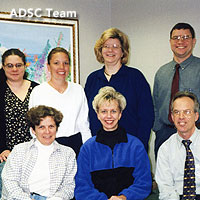 Dennis did home visits throughout the Chicago metropolitan area and provided wonderful counseling and referral services. After obtaining his PhD, Dennis was hired by the UAP as a Family Counselor, but NADS was able to negotiate with the UAP to allow us to retain Dennis as our “fellow.” It soon became obvious to us that medical conditions were closely related to some of the psychosocial problems we encountered. Therefore we began to search for ways that we might expand the work Dr. McGuire had been doing with our families.
Dennis did home visits throughout the Chicago metropolitan area and provided wonderful counseling and referral services. After obtaining his PhD, Dennis was hired by the UAP as a Family Counselor, but NADS was able to negotiate with the UAP to allow us to retain Dennis as our “fellow.” It soon became obvious to us that medical conditions were closely related to some of the psychosocial problems we encountered. Therefore we began to search for ways that we might expand the work Dr. McGuire had been doing with our families.
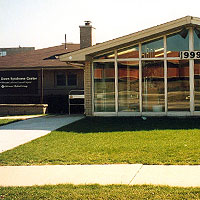 We searched far and wide to see if we could find a program that focused solely on the medical and psychosocial needs of adults with Down syndrome, and there was no such program. Therefore, we had to develop one. [For more about the development of this program, see “A Partnership to Celebrate” under the history menu at www.nads.org.
We searched far and wide to see if we could find a program that focused solely on the medical and psychosocial needs of adults with Down syndrome, and there was no such program. Therefore, we had to develop one. [For more about the development of this program, see “A Partnership to Celebrate” under the history menu at www.nads.org.
Adult Down Syndrome Center
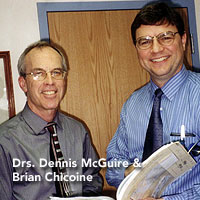 After several years of searching and coaxing, NADS was successful in securing a commitment from Lutheran General Hospital in Park Ridge to serve adults with Down syndrome. The Adult Down Syndrome Center (ADSC) opened in January 1992 and Dr. Brian Chicoine was appointed Medical Director. This marked the beginning of a unique collaboration between NADS and Lutheran General Hospital.
After several years of searching and coaxing, NADS was successful in securing a commitment from Lutheran General Hospital in Park Ridge to serve adults with Down syndrome. The Adult Down Syndrome Center (ADSC) opened in January 1992 and Dr. Brian Chicoine was appointed Medical Director. This marked the beginning of a unique collaboration between NADS and Lutheran General Hospital. 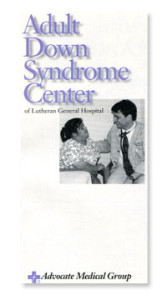 Initially Dr. McGuire split his time between the Center and theUAP but in March 1998 he joined the staff at the ADSC full-time as Director of Psychosocial Services.When the Center opened in 1992 patients were served 2 mornings a month, but by 2011 because of the huge demand, patients are now seen 5 days a week with 2 full-time physicians, a full-time nurse practitioner, 3 certified medical assistants, a full-time RN, a patient representative, a nutritionist, an outreach worker and patient advocate. NADS has always played an active role on the team of the ADSC, and we are very proud of this unique collaboration and the wonderful care teens and adults receive at the Adult Down Syndrome Center. NADS has helped fund the positions of outreach, patient advocate and part of the services provided by Dr. McGuire. In 2011 NADS was presented with a plaque recognizing that NADS has provided more than a million dollars to the ADSC. The Center has served over 5,000 individuals, and in 2011 there were over 7,000 patient visits.
Initially Dr. McGuire split his time between the Center and theUAP but in March 1998 he joined the staff at the ADSC full-time as Director of Psychosocial Services.When the Center opened in 1992 patients were served 2 mornings a month, but by 2011 because of the huge demand, patients are now seen 5 days a week with 2 full-time physicians, a full-time nurse practitioner, 3 certified medical assistants, a full-time RN, a patient representative, a nutritionist, an outreach worker and patient advocate. NADS has always played an active role on the team of the ADSC, and we are very proud of this unique collaboration and the wonderful care teens and adults receive at the Adult Down Syndrome Center. NADS has helped fund the positions of outreach, patient advocate and part of the services provided by Dr. McGuire. In 2011 NADS was presented with a plaque recognizing that NADS has provided more than a million dollars to the ADSC. The Center has served over 5,000 individuals, and in 2011 there were over 7,000 patient visits.
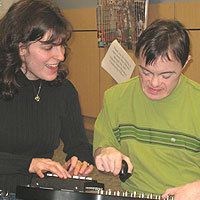 Specialized Respite Care Program for Adults
Specialized Respite Care Program for Adults
Through the work of the Adult Down Syndrome Center NADS became aware of some families in crisis, and we developed a program to address their needs. The Specialized Respite Care Program was a short-term program designed to assist families in great need of immediate intervention. It was limited to individuals who were homebound or had an unusual family crisis. This program was developed by NADS and was administered through the Patient Advocate at the Adult Down Syndrome Center and through a local agency that provided respite care services.
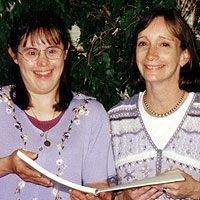 Work Experience Program
Work Experience Program
During the 1990s and early in the 2000s, individuals with Down syndrome were graduating from High School or from special education programs with no job skills and with very few options after graduation. Therefore, because NADS had an office at the Adult Down Syndrome Center, we developed a work experience program, which could be used by students who attended school close to the Center.
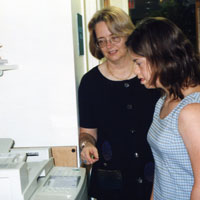 NADS developed this program to provide teens and adults with Down syndrome office experience that would help prepare them to enter the job market. We also gave them an opportunity to learn appropriate work etiquette, such as dependability, punctuality, communication, task completion, wearing proper attire and other skills required for successful employment.
NADS developed this program to provide teens and adults with Down syndrome office experience that would help prepare them to enter the job market. We also gave them an opportunity to learn appropriate work etiquette, such as dependability, punctuality, communication, task completion, wearing proper attire and other skills required for successful employment.
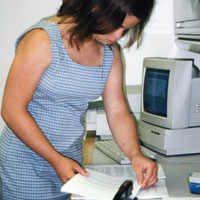 Our staff member whose office was at the Adult Down Syndrome Center coordinated this program, and she contacted local high schools every year informing them of this opportunity. The number of students varied from year to year, depending on the response of the high schools. Our staff member prepared the work, which included a variety of office tasks, such as copying, collating and preparing mailings and patient packets. However, a job coach accompanied each student and was responsible for their supervision.
Our staff member whose office was at the Adult Down Syndrome Center coordinated this program, and she contacted local high schools every year informing them of this opportunity. The number of students varied from year to year, depending on the response of the high schools. Our staff member prepared the work, which included a variety of office tasks, such as copying, collating and preparing mailings and patient packets. However, a job coach accompanied each student and was responsible for their supervision.
This program ended when the demand for medical services significantly increased at the Adult Down Syndrome Center and space for the students was not available.
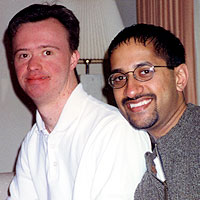 Adult Mentoring Program
Adult Mentoring Program
NADS also found that many adults with Down syndrome were lonely. While many participated in recreation programs and Special Olympics, some were quite isolated, and so we developed a unique program to address this need. The NADS Mentoring Program was developed in 1997, and even though it has been difficult to maintain, when successful matches are made and friendships developed, we have found it to be well worth the effort.
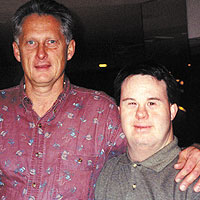 The goals of this program are to provide support to adults with Down syndrome who fall into the following categories:
The goals of this program are to provide support to adults with Down syndrome who fall into the following categories:
- Young adults who are out of school and living at home.
- Adults in need of assistance to get involved in their community.
- Older adults who have not received services and have become isolated.
Our ultimate goal is to create an environment whereby adults with Down syndrome have an opportunity to make new friends. We make an effort to match on the basis of interests, but because we hope to develop ongoing relationships, geographic location is a very critical factor. Each mentor was asked to be in phone contact with his or her friend once a week and to plan a get together once a month.
Meeting the Needs of the Underserved in the Down Syndrome Community
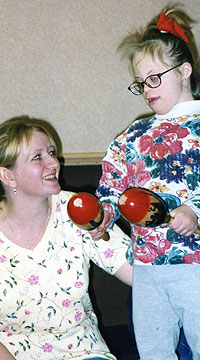 During the late 1990s NADS became aware that some of our children with Down syndrome had additional diagnoses, such as Autism or Attention Deficit Hyperactivity Disorder. After doing some research, we decided to develop a program focusing on the needs of these children and their families, who were feeling very isolated; some even expressed that they didn’t feel welcome in the Down syndrome support system because of their child’s challenging behaviors.
During the late 1990s NADS became aware that some of our children with Down syndrome had additional diagnoses, such as Autism or Attention Deficit Hyperactivity Disorder. After doing some research, we decided to develop a program focusing on the needs of these children and their families, who were feeling very isolated; some even expressed that they didn’t feel welcome in the Down syndrome support system because of their child’s challenging behaviors.
Family Behavior Retreat
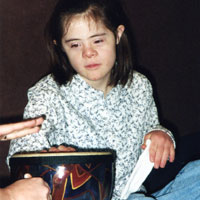 Beginning in 1998, NADS provided a weekend retreat for families whose child with Down syndrome had an additional diagnosis, such as Autism or ADHD. The Family Behavior Retreat was usually held in the spring of each year. During the Retreat, children were cared for by experienced respite workers and spent the weekend engaged in fun activities, such as swimming and music therapy, while parents focused on learning new ways to help their child. We kept the numbers small so that we could provide a nurturing environment for families.
Beginning in 1998, NADS provided a weekend retreat for families whose child with Down syndrome had an additional diagnosis, such as Autism or ADHD. The Family Behavior Retreat was usually held in the spring of each year. During the Retreat, children were cared for by experienced respite workers and spent the weekend engaged in fun activities, such as swimming and music therapy, while parents focused on learning new ways to help their child. We kept the numbers small so that we could provide a nurturing environment for families.
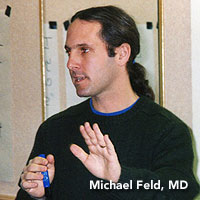 The Retreat was offered as a way for families who were under a great deal of stress to have a respite from the demands of their daily lives. For the children we ensured a one-on-one ratio of respite workers to children in order to ensure that the children could safely enjoy the activities planned for them. For parents, we provided a variety of experienced professionals who addressed issues of concern to them and who gave them practical strategies for coping with the communication and behavioral challenges of their child.
The Retreat was offered as a way for families who were under a great deal of stress to have a respite from the demands of their daily lives. For the children we ensured a one-on-one ratio of respite workers to children in order to ensure that the children could safely enjoy the activities planned for them. For parents, we provided a variety of experienced professionals who addressed issues of concern to them and who gave them practical strategies for coping with the communication and behavioral challenges of their child. 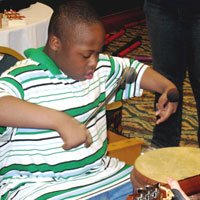 Many wonderful professionals were very helpful and generous with their time – two who came back year after year were Dr. Lou Weiss and Dr. Michael Feld. We also brought families together who might not otherwise have had a chance to meet; the retreat made it possible for them to share their stories and find support and encouragement from each other.
Many wonderful professionals were very helpful and generous with their time – two who came back year after year were Dr. Lou Weiss and Dr. Michael Feld. We also brought families together who might not otherwise have had a chance to meet; the retreat made it possible for them to share their stories and find support and encouragement from each other.
In recent years, the format of the retreat has changed to one-day programs held more frequently to enable more families to participate.
Serving the Hispanic Community
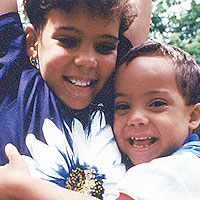 Even though NADS had been training Spanish-speaking support volunteers for many years and some of our materials, including our booklet for new parents, A Baby First, were available in Spanish, we realized that the needs in the Hispanic community were not being adequately met, and in 2005, we hired a Bi-lingual Coordinator to help us better serve these families. We developed the following programs to help us address their needs:
Even though NADS had been training Spanish-speaking support volunteers for many years and some of our materials, including our booklet for new parents, A Baby First, were available in Spanish, we realized that the needs in the Hispanic community were not being adequately met, and in 2005, we hired a Bi-lingual Coordinator to help us better serve these families. We developed the following programs to help us address their needs:
In 2005 NADS developed a pilot program to help improve and expand our services to Spanish speaking families in the Chicago metropolitan area. This was an important step because more than 25% of all new families we served that year were Hispanic, and the number was increasing. This pilot program was then incorporated into our regular services when our Bi-lingual Coordinator became a member of our staff. She now works closely with new parents, and she also provides educational advocacy.
Our booklet A Baby First has been published in Spanish for many years and our brochures are also available in Spanish. In addition to training bi-lingual support volunteers for many years we have conducted training sessions for those who only speak Spanish, and they are available to work with our new families.
NADS conferences have also included workshops in Spanish, and we provided translation services for the general sessions.
NADS Involvement with Down Syndrome Research
From the very beginning, NADS has been interested in Down syndrome research. In the 1960s and 1970s, we invited many researchers to speak at our conferences. They reported on medical, cognitive and educational research projects not only from the U.S., but also from Great Britain, Germany, France and many other parts of the world.
Megavitamins and Minerals
From the 1940s the issue of treating children with Down syndrome with mega vitamins was a topic of interest to parents of children with Down syndrome. In the 1940’s a physician in Detroit, Dr. Henry H. Terkel, developed a mixture of vitamins and minerals, which became known as the U-series. By the 1950s Terkel was focusing mostly on Down syndrome. Many parents were anxious to do anything that might help their child, and so they put their children on Dr. Terkel’s program.
In 1981 Dr. Ruth Harrell and colleagues at Old Dominion University in Virginia published a report that made everyone sit up and take notice. This was a small study with only 16 participants. Dr. Harrell reported that some children with Down syndrome who had been given mega doses of vitamins and minerals had increased IQ scores as high as 25 points in one case.
Many NADS parents contacted NADS to ask about the Harrell study, and it was determined that doing a double-blind, well controlled study could be beneficial not only to NADS families, but to families across the country and beyond.
Use of Megadoses of Vitamins with Minerals in Down Syndrome – Chicago Study
George F. Smith, MD,
Donna Spiker, Ph.D.
Carol P. Peterson, PhD,
Dante Cicchetti, PhD
Parvin Justine, Ph.D.
In 1981 NADS worked closely with Dr. George Smith and his team to put this important study together. We recruited children to participate in the study, which was conducted at Illinois Masonic Hospital in Chicago. In addition, NADS provided some funding for this study.
The purpose of the study was to evaluate the effects of mega doses of vitamins and minerals on the cognitive intelligence of children with Down syndrome. There were a total of 56 children and they were separated into 2 groups with 28 children in each group. The average age in each group at the beginning of the study was 11 years. This was an 8-month study, and children were evaluated at baseline, 4 months and 8 months with psychological tests, physical exams and blood tests. The results showed that both groups of children made improvement over the 8-month period, but no difference were found between those children taking the megavitamins and those taking placebos.
A complete report on this study was published in The Journal of Pediatrics, Vol. 105. 2,pp. 228-234, August 1984.
Congenital Heart Research
Nancy Roizen, MD
Deborah Bryk-Serva, MD
In the late 1980s NADS was concerned about many of our children not having appropriate heart screening at birth. At that time, Dr. Nancy Roizen, Director of the Pediatric Down Syndrome Clinic at the University of Chicago, shared our concern, and in 1989 Dr. Roizen and Dr. Deborah Bryk-Serva, Pediatric Cardiologist, developed a research project to look at this issue. NADS provided some funding, and through our Parent Support Program we recruited more than 130 babies for the study. Participants were at least 3 months of age and had not been screened for heart disease with an echocardiogram. Each child in the study had a comprehensive physical exam as well as a cardiac evaluation, including an echocardiogram. Approximately 30% of these babies were found to have heart problems.
The results of this study clearly documented the need for all infants with Down syndrome to be evaluated by a Pediatric Cardiologist and an echocardiogram at birth or shortly thereafter – this is now clearly recommended in the Down Syndrome Health Care Guidelines.
Heart Study in Adults with Down Syndrome
When the Adult Down Syndrome Center opened in 1992, NADS developed an aerobics program for adults. Since very little research had been done on adults with Down syndrome, we provided funding to the Center to offer cardiac screenings for patients at the Center before they were allowed to participate in the aerobics program. This involved an evaluation by a cardiologist, a stress test and other cardiac assessments. No major cardiac problems were found in this study.
Energy Expenditure in Children with Down Syndrome
Amy Luke, Ph.D.
Nancy Roizen, MD
Marjorie Sutton, MS, RD
Dale Schoeller, Ph.D.
In 1989 Dr. Nancy Roizen asked NADS to recruit children for a study on nutrition and weight in children with Down syndrome, which was conducted at the University of Chicago Wyler Children’s Hospital and LaRabida Children’s Hospital in Chicago. This study was undertaken to examine the relationship between energy expenditure and obesity in children with Down syndrome in comparison with control subjects, and to provide data to help define daily energy requirements of prepubescent children with Down syndrome. NADS recruited children with Down syndrome, and a control group was recruited from another source.
A complete report on this study was published in the Journal of Pediatrics, Volume 125, Issue 5, Part 1, November 1994.
Resources
Resource Library
Until recently, NADS maintained a Resource Library at the Adult Down Syndrome Center, which contained hundreds of books, audiotapes, DVDs and videos related to Down syndrome. The materials were available for loan to NADS members, patients of the Adult Down Syndrome Center and their families or caregivers, but due to space constraints and administrative challenges, NADS made the decision to discontinue the lending service, and the materials from the library are currently being distributed to local communities.
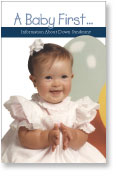 NADS Materials
NADS Materials
Because there was so much inaccurate information about Down syndrome throughout the years, NADS has produced materials to correct these inaccuracies and myths. Our materials highlight the value, gifts and contributions that children and adults with Down syndrome bring to their families and to the broader community.
In 1990 NADS published a booklet for new parents, “A Baby First.”Parents and parent organizations throughout the country and also in other countries have used this beautiful 12-page booklet, which they give to their new parents. It was the first 4-color booklet published in the U.S on Down syndrome. NADS also developed a “Special Delivery Folder” which is given to new parents as part of our new parent packet.
We also developed a series of beautiful posters with a theme of “Don’t Be Surprised.” There were seven posters in this series, and they were displayed all over the country and in Canada as well. Staying with the “Don’t Be Surprised” theme, we also developed a total of 21bookmarks that were used to highlight the gifts and talents of children and adults with Down syndrome.
NADS developed several Audio/visual programs:
- You Don’t Outgrow Down Syndrome
- New Expectations for Down Syndrome
- A Friend Like You
- Don’t Be Surprised
- Talents That Inspire
NADS Website
The NADS website was developed by NADS board member, Bill McCarthy, in 1996. It provides general information about Down syndrome as well as listings of NADS programs and numerous Down syndrome resources. The website was redesigned in 2003 by Kurt Metzler who has continued to be our webmaster since then. A very active feature for several years was the Discussion Forum, which provided a supportive environment where people in the Down syndrome community found information and shared their children’s accomplishments and asked for support during challenging times. Parents often helped each other by addressing questions or by posting useful resources they had discovered. Initially this forum met a significant need and generated a lot of energy, and while it is still used by some people, with the development of the Blogosphere and Facebook, more and more parents are communicating more directly with a variety of people. Other social networking sites allow parents to share information much more easily than was possible in the past. NADS is also on Facebook, which is another way that we are helping to keep people connected and up-to-date.
The website continues to be a great vehicle for NADS to communicate with our members and the broader community on a variety of issues and events.
E-Mail Alerts
In 2000 NADS started a list serve e-mail alert system and members were notified of legislative alerts and events of interest to the Down syndrome community.
NADS Presidents
John Lee 1961 – 1964
Dave Zanoni 1964 – 1966
Bob Mead 1966 – 1968
Ron Krupp 1968 – 1974
Lucille Msall 1974 – 1975
Tony Micelli 1975 – 1979
Art Dobbelaere 1979 – 1980
Ken Miller 1980 – 1984
Mary Nicoson 1984 – 1985
Elaine Greenbaum 1985 – 1986
Dan Moore 1986 – 1988
Peggy Bourke 1988 – 1991
JoAnn Hart 1991 – 1996
Tom Herr 1996 – 1997
Dan Moore 1997 – 2000
Bill McCarthy 2000 – 2003
Diane Gomboz 2003 – 2008
Jackie Rotondi 2008 – 2012
Steve Connors 2012 – 2017
Katie Wood 2018 – 2020
NADS Executive Directors
Byrne Witt 1973-1974
Karen Cornell 1978-1979
Sheila Hebein 1979-2009
Diane Urhausen 2009-2017
NADS Historical Timeline
| 1960 | Organization was formed as MDC |
| 1972 | Name changed to National Association for Down Syndrome |
| 1975 | NADS first local support group was formed. |
| 1979 | NADS held first parent support training program |
| 1980 | Development of hospital education program |
| 1982 | NADS temporary foster care program was developed |
| 1984 | NADS trained first group of public speakers |
| 1987 | Trained parents to become education facilitators |
| 1989 | NADS fellowship at the UAP was developed |
| 1990 | A Baby First was first published |
| 1991 | Commitment by Lutheran General Hospital to start a clinic for adults with Down syndrome |
| 1992 | Adult Down Syndrome Clinic (Center) opened |
| 1998 | NADS held first behavior retreat |
| 2005 | NADS formalized program for Hispanic families |
In Memory of 2 Beloved Staff Members
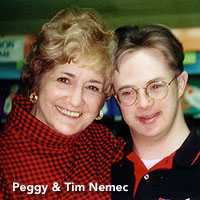 Peggy Nemec
Peggy Nemec
Peggy joined the NADS board of directors in 1979 – her son, Tim, was born with Down syndrome in 1978. Peggy was in our first training program for Parent Support Volunteers and she served on the board of directors until 1984 when she joined the NADS staff as our Office Coordinator. Peggy was also our Family Support Coordinator and in that role she was a source of strength and support to hundreds of NADS families. Peggy was loved by many and she worked faithfully for NADS until her death in September 2004.
Linda Picchi
Linda’s daughter, Angie, was born in 1980 and she took our Public Speaker Training Course in 1986. She joined the NADS staff in 1989 as Program Coordinator. 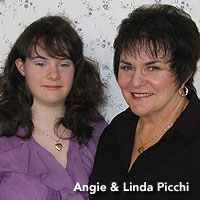 In that capacity she expanded our Hospital Education Program and she provided hundreds and hundreds of hospital in-service programs throughout the Chicago metropolitan area. Linda also worked with college, high school and elementary school students – providing them with valuable information and insights. Linda also provided wonderfully sensitive support to many parents throughout the years.
In that capacity she expanded our Hospital Education Program and she provided hundreds and hundreds of hospital in-service programs throughout the Chicago metropolitan area. Linda also worked with college, high school and elementary school students – providing them with valuable information and insights. Linda also provided wonderfully sensitive support to many parents throughout the years.
Linda worked with much dedication for NADS until the summer of 2010 and we were devastated when she died in December 2010.
- Sheila Hebein served 5 years as a board member and 30 years as Executive Director.
- Peggy Nemec served 5 years as a board member and 20 years as Office Coordinator.
- Linda Picchi was a public speaker for 3 years and then worked 20 years as Program Coordinator.
- The total time of commitment to NADS and to the Down syndrome community of these 3 women was 83 years. We may never see that again.

